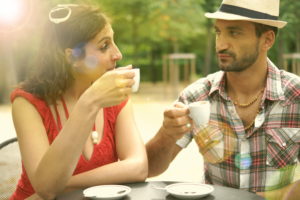
All of us are familiar with the “Prince charming” myth. Basically, the story is that “somewhere out there” our perfect soul mate exists. Our only job is to “find” this ideal person, wherever they might be.
The reality is of course much different. Relationships fail, despite the way they begin, with such promise, such excitement, and such hope for a “happily ever after.” Unfortunately, the ripple effects of failed relationships extend far beyond the original people involved. Families break up. Children, in particular are traumatized.
But, what about the relationships that succeed? What about relationships that sustain, grow and deepen over long periods of time? What’s the key to this longevity? What can we learn?
It seems to me it’s got something to do with “picking” and “choosing” at the very outset of any relationship. How can you “know” that a relationship is right for you? How can you move beyond the initial excitement of attraction?
Here are some guidelines to help in your “discernment” process.
Three keys to fine tuning your “picker”
KNOW YOURSELF
Who are you? Begin a process of developing an honest inner dialog with yourself wherein you know how you are in relationship to others. Notice if you feel better when you have close and frequent contact with a partner, as opposed to more time to yourself. If you have an “attachment style” that dictates a need for more frequent contact, you might want to choose someone who more closely mirrors your style. Also…. what is your “love language”? Do you like a lot of physical contact? Do you thrive when you receive a lot of “words of affirmation” from a loved one?
GET TO KNOW YOUR PARTNER
Who is your partner? What can you find out about their “attachment style”? How does your partner prefer to show and be shown love? Answers to these questions can come through your “open ended” questions about previous relationships. Don’t hesitate to ask the important questions.
TAKE YOUR TIME WITH NEW RELATIONSHIPS. LET THEM EVOLVE
Above all, don’t be in a hurry. Experiment with spending longer times with a new relationship…including being with them 24/7…like on an extended vacation. This allows for opportunities to have leisurely conversations, and to see each other as you really are…not always as your best and most “polished” self. If you see “red flags…pay attention. There is way too much at stake to simply ignore these signs.
So, what can you expect if you follow these three steps, as outlined above?
Here is what I can tell you…what I know for sure:
There is no magic solution to finding a relationship that is uniquely suited for you. Like most things worthwhile in life, the results you seek take time, patience, faith, and perseverance. Be prepared to experience some “false starts”, and know that these too are a part of the process. Most of all, don’t give up hope. The reward for hanging in there is well worth the wait









